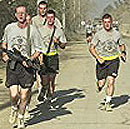 |
| Soldiers
jog every day to keep their body fit in their tour of duty
but have to endure the dust around the base |
Even to a physician like U.S. Army Capt. D.J. Doyle, the list
of diseases in Afghanistan is frightening: typhoid fever, dengue
fever, polio, cholera, leishmaniasis, Crimean-Congo hemorrhagic
fever.
And then there's the dust.
"I go running every day. The first time I saw the dust in
the air, I thought 'Oh my God, I'm going to get so sick,'"
said Doyle, 38, acting surgeon for the 82nd Airborne Division
in Afghanistan. "But it just hasn't happened."
The threat of disease and ailments hangs over any military force
entering a foreign environment. In a country like Afghanistan,
where sanitation and Western hygiene standards are virtually nonexistent
and soldiers interact with the populace regularly, the prospect
is even more unnerving.
"For a U.S.-trained physician and soldier, the idea of going
to a place where something like hemorrhagic fever is endemic scares
the hell out of me," Doyle said.
U.S. medical planners' fears of illness were based on past experience.
In Vietnam, malaria sapped many troops' strength. Concerns were
also stoked by the experience of the Soviet army during its war
and occupation of Afghanistan in the 1980s.
An estimated two-thirds of all Soviet troops who fought in Afghanistan
were hospitalized with some disease or illness. Hepatitis A, typhoid
fever, malaria, dysentery and even plague were the primary diseases
that afflicted the Soviets.
"It's not unrealistic to say the Soviets lost the war here
because of disease non-battle injuries," Doyle said.
For U.S. military troops, disease non-battle injury rates have
run at about 1 percent since U.S operations began in Afghanistan
last November. Most problems have been respiratory, which is attributed
to the high altitudes and the dusty environment.
Because many diseases in Afghanistan are also water- or food-borne,
efforts also focus on basic hygiene. Combat troops out in the
field are given bottles of anti-bacterial hand lotion and warned
to stay away from locally-grown produce.
But all these things are not enough. "The bottom line is
that war is not a healthy thing." Doyle said.
(Agencies)
